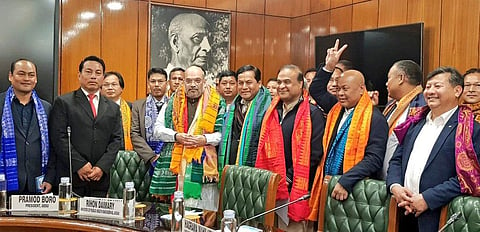

GUWAHATI: The Narendra Modi-led Central government signed a 'historic' and the third accord with the Bodos in Assam on Monday to solve a near four-decade-old insurgency problem but it is likely to face a challenge in implementing particularly two commitments made through the accord.
The first one being, the inclusion of villages contiguous to Bodoland Territorial Areas District (BTAD) having a majority tribal population to BTAD. The second being the protection of the rights of Bodos living outside BTAD by way of inclusion of them in the list of Scheduled Tribes (Hill) of Assam in a time-bound manner.
Four Lower Assam districts such as Kokrajhar, Chirang, Udalguri and Baksa, which fall under BTAD, are partially administered by the autonomous Bodoland Territorial Council. They together have just one Lok Sabha seat (Kokrajhar) and the non-Bodos constitute around 70 per cent of the voters.
The non-Bodos being wary of the Bodo accord was evident from Monday’s Assam bandh which was called by several of their organisations. The bandh crippled normal life in parts of BTAD.
There has also been a growing divide between Bodos and non-Bodos living in BTAD after 600 villages, allegedly with zero Bodo population, were included in BTAD in 2003 following Centre’s signing of the second Bodo accord with erstwhile insurgent group Bodo Liberation Tigers.
The Centre said a Commission will be appointed to examine and recommend the exclusion of villages with majority non-tribal population from BTAD and inclusion of villages contiguous to BTAD and having a majority tribal population to BTAD.
ALSO READ | Bodo Accord will usher in new dawn of peace, harmony, togetherness: PM Modi
However, the non-Bodos living in BTAD are likely to resist any move to include any new village in BTAD even if it has a tribal majority population.
Granting ST (Hill) status to the Bodos living outside BTAD is a commitment which the Centre had made in 2003 but could not implement it as there has been a resistance in some areas, particularly the hill district of Karbi Anglong, from other ethnic communities. They fear if the Bodos settled there are granted ST status, they would cut into their benefits, including reservation of seats for STs in various fields.
Promod Bodo, who is the president of All Bodo Students’ Union (ABSU) and a signatory of Monday’s accord, said if everything committed in the accord were implemented in letter and spirit, it would help bring in permanent peace in BTAD.
ALSO READ | Peace Accord will lead to full, final solution to Bodo issue: Assam Minister Himanta Biswa Sarma
He was hopeful the government will not face any hurdles in implementing the commitment about granting ST (Hill) status to Bodos living outside BTAD.
'I don’t think there will be any problem while granting ST (Hill) status to Bodos living outside BTAD as the Assam and Central governments and concerned ministries studied every aspect. If the government has a will, everything written in the accord can be implemented early,' Promod Bodo said while speaking to The New Indian Express.
He said he would observe if the Centre raises the issue in the next Parliament session. He also did not feel the government will face a challenge in including villages, contiguous to BTAD and having tribal majority, to BTAD. 'There will be a problem if people want to create a problem,' he said.
Observers closely following the Bodo movement say implementing contentious issues may continue to prove difficult.